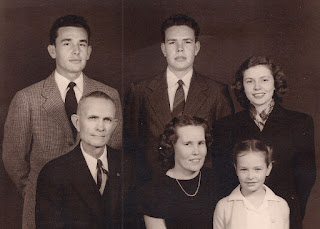Vonette Zachary Bright evoked admiration and respect in many circles the world over. Some people may have never had the privilege of meeting her. Hopefully, this short account will give a glimpse into the godly woman she was.
The Life-Long Impact of a One-Time
Meeting
I have played for
countless weddings over the years. Rehearsals preceded most of those nuptials. Rehearsal
dinners featured foods ranging from donuts with coffee, barbeque, a traditional
Osage meal, heavy hors d’oeuvres, family-style Italian, to an assortment of other
delicious food accompanied by uplifting conversation. One of these events
inspired a remembrance.
I don’t recall the
specifics about the food, just that it was good. We dined at a sit-down meal in
the basement of the Ralston Bible Church. Lots of laughter filled the evening the
night before the marriage of Gaylynn Rice and Michael Treat on April 2, 1988.
The one happening
of the evening most memorable to me was the blessing by the bride’s aunt,
Vonette Zachary Bright. I knew who she was – the co-founder of CRU (At its
inception, it was called Campus Crusade for Christ.) with her husband, Bill. My
involvement in CRU during my first year at Oklahoma State University provided
the stability and support needed for me to successfully navigate my transition.
My grandmother, Gladys Rainey Smith, admired Vonette Bright’s commitment to serve the Lord. She delighted in discussing Mrs. Bright and her husband’s work with her great-nephew, Bob Rice. Of course, Vonette Bright was Bob’s sister-in-law! Vonette and my grandma would want you to see this:
http://www.4laws.com/laws/englishkgp/default.htm
My grandmother, Gladys Rainey Smith, admired Vonette Bright’s commitment to serve the Lord. She delighted in discussing Mrs. Bright and her husband’s work with her great-nephew, Bob Rice. Of course, Vonette Bright was Bob’s sister-in-law! Vonette and my grandma would want you to see this:
http://www.4laws.com/laws/englishkgp/default.htm
At the rehearsal
dinner, prior to our meal, Vonette stood and spoke to Gaylynn and Mike about
the principles needed for them to have a
successful marriage. Vonette presented, with skill and beauty, a concise
message of the love of Jesus and how each of us could and should have
meaningful lives as followers of Jesus. What a profound impression Vonette’s
few sentences had on me! No other rehearsal dinner impacted my memory as that
one in April of 1988.
 |
| Bob and Deanne Zachary Rice with Vonette and Bill Bright - photograph from Deanne Zachary Rice's collection Through out my whole life she has mentored me and has had a profound influence on me. She was the perfect big sister. She always made a big deal out of birthdays and family get togethers. Everyone always felt special and deeply loved. She carried that into her ministry with Cru. Staff members were like her children and family.She knew them by name, prayed for them individually, and helped them adjust to their calling in the ministry. - a quote by Deanne Zachary Rice |
On January 8,
2016, Mother and I were able to view online the memorial service for Vonette
Zachary Bright. Over a hundred people posted online the positive way she had influenced
their lives. Beautiful music, powerful tributes, and encouraging scriptures
seamlessly wove themselves into an uplifting worship experience.
Kay Arthur used
four points to honor Vonette Bright based on the life of the judge, Deborah, in
the book of Judges from the Bible. She drew the comparison between Deborah and
Vonette with these:
1.
They both listened to God. (Am I daily reading God’s word so I too can listen to Him?)
2.
They both enlisted others. (Do I seek to find as many others as possible to work
with to accomplish God’s work?)
3.
Neither Vonette or Deborah cared who got the
glory for their work. (Oh how I want to be
exactly like them!)
4.
Both women experienced and handled grief. (I want to be like them, experiencing a loss,
grieving the loss, but finding purpose in the grief.)
Deanne
Zachary Rice, the only sister of Vonette Bright, has encouraged me as she
serves at funeral dinners and opens her home to host women’s Bible studies. Deanne’s
commitment to support selflessly her husband, children and grandchildren enriches
their lives and undergirds them as they seek to impact all they meet.
 |
| Deanne and I laughed about how this photograph from the early 1940s indicated the humble beginnings of Vonette in Coweta, Oklahoma. Only God knew she would minister and touch lives all over the world. She is second from the right on the upper row. Deanne is the first VBS student in the front row. (Photo from Deanne Zachary Rice's collection) She served a big God and she trusted Him for big things, therefore she encouraged people to go beyond their own limits to God's limits and she would always be there to get you started. She was a "Why Can't We?" type of person. - a quote by Deanne Zachary Rice |
To learn more about Vonette Zachary Bright go to:
https://www.cru.org/us/en/about/vonette-bright.html
https://www.cru.org/us/en/about/vonette-bright.html





